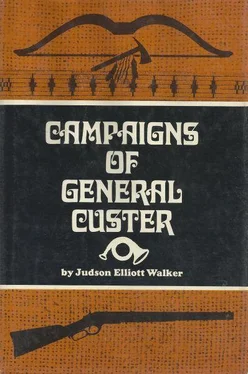Walker Array - Campaigns of General Custer in the North-west, and the final surrender of Sitting Bull
Здесь есть возможность читать онлайн «Walker Array - Campaigns of General Custer in the North-west, and the final surrender of Sitting Bull» весь текст электронной книги совершенно бесплатно (целиком полную версию без сокращений). В некоторых случаях можно слушать аудио, скачать через торрент в формате fb2 и присутствует краткое содержание. Жанр: Историческая проза, Исторические приключения, Приключения про индейцев, на английском языке. Описание произведения, (предисловие) а так же отзывы посетителей доступны на портале библиотеки ЛибКат.
- Название:Campaigns of General Custer in the North-west, and the final surrender of Sitting Bull
- Автор:
- Жанр:
- Год:неизвестен
- ISBN:нет данных
- Рейтинг книги:5 / 5. Голосов: 1
-
Избранное:Добавить в избранное
- Отзывы:
-
Ваша оценка:
- 100
- 1
- 2
- 3
- 4
- 5
Campaigns of General Custer in the North-west, and the final surrender of Sitting Bull: краткое содержание, описание и аннотация
Предлагаем к чтению аннотацию, описание, краткое содержание или предисловие (зависит от того, что написал сам автор книги «Campaigns of General Custer in the North-west, and the final surrender of Sitting Bull»). Если вы не нашли необходимую информацию о книге — напишите в комментариях, мы постараемся отыскать её.
Campaigns of General Custer in the North-west, and the final surrender of Sitting Bull — читать онлайн бесплатно полную книгу (весь текст) целиком
Ниже представлен текст книги, разбитый по страницам. Система сохранения места последней прочитанной страницы, позволяет с удобством читать онлайн бесплатно книгу «Campaigns of General Custer in the North-west, and the final surrender of Sitting Bull», без необходимости каждый раз заново искать на чём Вы остановились. Поставьте закладку, и сможете в любой момент перейти на страницу, на которой закончили чтение.
Интервал:
Закладка:
Colonel Boone has since held various honorable posi-e tions in the Interior Department, and has been employed in making treaties with some of the wild tribes who are located further north than those above mentioned.
His course of conduct among wild Indians has always been that of pacification, his mode of treatment kind, and his rules and regulations very strict and impartial His health has now in great measure failed, and the Interior Department has lost a valuable servant. His. son-in-law, Lieut.-Colonel Elmer Otis, of the 7th'Cavalry (Custer's former position), is one of the most valuable and popular officers on the frontier.
The complications arising among the military officers in the Southern Indian District, in consequence of the famous " Battle of the Washita," are part of the history of the country, and need not be here recapitulated. The military operations in the Southwest, during 1368 and 1869, have been recorded at length in " Custer's Life on the Plains," which is still further supplemented by a pamphlet entitled, " Some Corrections of Life on the Plains," issued by General Hazen in 1875.
To recount the history of military campaigns against these wild tribes, has not entered into the plan of this volume, whose object has been rather to give to the reader a cursoiy but correct view of the character and status of the Indians involved. At that date peace councils were in the ascendancy in Indian affairs, and General Hazen had been assigned, in the autumn of 1868, in the interest of the Peace Commission, to the charge of all the wild Indians south of Kansas, comprising then the tribes above mentioned.
General Hazen made an eloquent appeal to the government for the restoration of their rights to the displaced Wichitas, but the return of their lands was found to be impossible, and they were provided for elsewhere.
General Hazen and Colonel Boone were both remarkably successful in their treatment of the Indians and in their schemes for their welfare, so far as they were permitted to extend their authority. But at this juncture a new administration came into power, and with the dawn of Grantism went out much that was calculated to improve and elevate the Indian.
Little attention was paid to the qualifications, energy or trustworthiness of the incumbents of offices. Boom had to
be made for a new set of officers, whether competent or incompetent, hence the agencies were turned over to a new class of men. It is proper to state, however, that many of the in-coming men made very good and efficient agents. It is proper to place proper credit where it belongs, and do injustice to no one. The Indians, however, became very uneasy, and greatly dissatisfied, at this change in their agents. They had become acquainted with General Hazen and Colonel Boone, and their administration had proved satisfactory to them, and this change no doubt led to the raids that were made into Texas during the following year. The new agents were good men enough, but the Indians were bound to become discontented at any frivolous reason that presented itself. So far as learned, it appears that when changes were to be made at Indian agencies, they were made with a sweeping hand, regardless of future consequences, and without any respect whatever to the qualifications and behavior of the previous occupants. It seems that no more respect was shown to the occupants, than was shown by ex-Secretary of War Belknap to post traders, when he made his raid upon them, regardless of the trouble that might arise from such summary proceedings, among themselves and their creditors generally.
Orders were issued by the parties in power, just because they had the power to issue them, and for no other reason, as it has been clearly demonstrated that the question of right or wrong did not enter into their calculations at all
Such conduct on the part of the high official^ of the country of course had its demoralizing effect upon the army officials throughout the West. They could not, consequently, look up to their leading civil officers with any feeling of respect, knowing, as they did, that they were degrading their offices, and assigning them to duties that were designed but to aid in their cwn peculations.
The Indians, of course, were but too well advised in regard to Belknap's sweeping orders among traders, as it drove away many who for years had been trading honorably among them. Some of the wily chiefs and warriors had named the Secretary of War " The-Heap-Big-Steal- Chief." "He no good; he steal'em all," was a frequent ejaculation. Thus, even the Indians shared with the brave little army of the frontier in the demoralizing effects of the short-sighted policy of the War Department, and divided with its officers the contempt with which they regarded the selfish, dishonest head of the War Department. Indians, as a rule, are shrewd traders, especially when they have an equal chance with white men. In those days they would nick-name the trader "Steal-Chief," on account of his holding his appointment under Belknap.
No less demoralized were the Indians in the Northwest, particularly along the Upper Missouri, when President Grant made his tyrannical orders and changes. Old Indian traders of good standing were removed without cause, and for no reason but to make room for a lot of petty politicians from Philadelphia, who were merely subordinates to aid Orville Grant, a brother of the President, in his unhallowed schemes of legalized plunder.
Indian reservations were extended regardless of the protests of old settlers and squatters, whose rights were utterly ignored-all for no other purpose than to increase the domain and, consequently, the profits of the newly-appointed trader.
If an old trader was allowed to hold his position at all, it was in consideration of paying the newly-appointed trader a stipulated sum. When first approached for negotiations upon the subject, the newly-appointed trader would invariably say, " We will see Orville Grant about it; you know he fixes things."
Such open dishonesty on the part of the high officials of the nation naturally had a very great tendency to demoralize the already discontented and half-tamed warriors. Small wonder, then, that they demanded of the government better treatment for themselves. Nor was it to be wondered at that they often made declarations and direct charges against the whites that their hunting-grounds and buffalo were being stolen, and dishonest traders forced upon them, to rob their squaws and papooses in the regular way of trade. There is no question in regard to the Indians losing
what little confidence they ever did have in the general government, after these high-handfcd operations in and about their agencies.
More than one warrior became disgusted with this previously unheard-of management, and left his tepee in charge of the old men and women, and took to flight on his fleet pony to join Sitting Bull's camp. There is no doubt among Western men, who are well informed in frontier matters, that this disgraceful management was the cause of swelling Sitting Bull's ranks in the campaign of 1876, so well known throughout the country as " Custer's last battle."
The evil results of the example of such unprincipled dealing on the part of the government before the eyes of the savages were greatly to be deplored. The Indians had always been promised good treatment and fair dealing in trade, if they would leave the war-path, forsake their wild habits, and become a good and peaceful people. The author does not pretend to say that the Indians were in the least justifiable in going on the war-path on account of the bad treatment received from the high and dignified officials of the land, yet it is a fact beyond question, that the average Indian is very sensitive in regard to the treatment he receives, his mind being quite clear upon subjects with which he is acquainted, and his only recourse against injustice, or what he may consider dishonest or unfair treatment on the part of the whites, is to go on the war-path and seek revenge in bloodshed for his real or fancied wrongs, just as Bain-in-the-Face joined the hostile forces of Sitting Bull, to avenge his treatment at the hands of General Custer, in being arrested and held a prisoner in the post guard-house at Fort A. Lincoln, during the winter of 1875, not many months before Custer's last battle. Bevenge for wrongs inflicted upon himself or his race, is the first article in the Indian's moral creed, hence it is fair to presume that he will carry a revengeful spirit in his bosom, until its consuming fires are quenched by a higher civilizing influence than any yet applied to him, and until he is thoroughly subjugated and made to obey the laws and regulations of our common rulers.
Читать дальшеИнтервал:
Закладка:
Похожие книги на «Campaigns of General Custer in the North-west, and the final surrender of Sitting Bull»
Представляем Вашему вниманию похожие книги на «Campaigns of General Custer in the North-west, and the final surrender of Sitting Bull» списком для выбора. Мы отобрали схожую по названию и смыслу литературу в надежде предоставить читателям больше вариантов отыскать новые, интересные, ещё непрочитанные произведения.
Обсуждение, отзывы о книге «Campaigns of General Custer in the North-west, and the final surrender of Sitting Bull» и просто собственные мнения читателей. Оставьте ваши комментарии, напишите, что Вы думаете о произведении, его смысле или главных героях. Укажите что конкретно понравилось, а что нет, и почему Вы так считаете.












